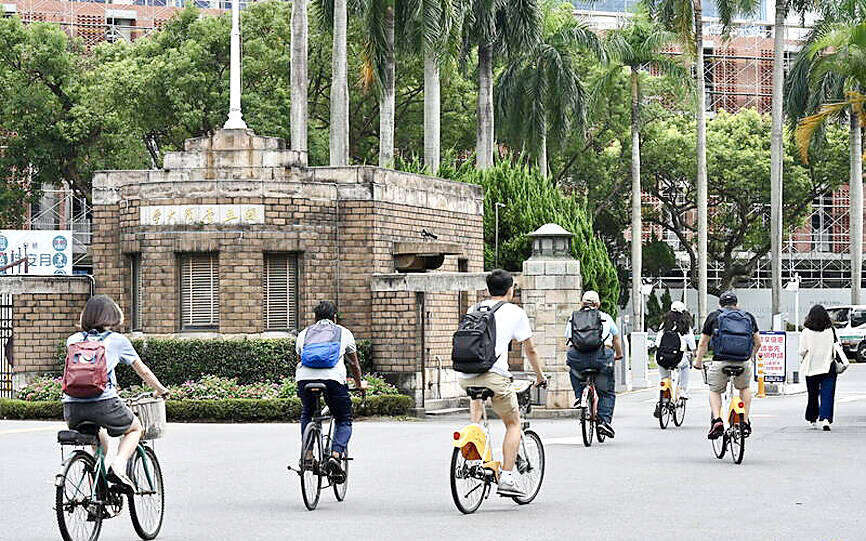Eight Taiwanese universities have been listed in the top 100 universities in Asia by global higher education analyst Quacquarelli Symonds (QS), with National Taiwan University (NTU) ranked 21st, the best-performing Taiwanese university in the QS Asia University Rankings released on Wednesday.
However, NTU fell out of the top 20 for the first time since 2020, the year in which it first entered the top 20 at No. 20.
NTU was ranked 19th in the QS Asia University Rankings for three consecutive years from 2021 until this year.

Photo: George Tsorng, Taipei Times
Taiwan’s seven other universities in the top 100 were National Tsing Hua University (39th), National Cheng Kung University (41st), National Yang Ming Chiao Tung University (47th), National Taiwan University of Science and Technology (74th), National Taiwan Normal University (79th), National Taipei University of Technology (82nd) and National Sun Yat-sen University (99th).
Another five Taiwanese universities ranked in the top 200, including Taipei Medical University (108th), National Chengchi University (112th), National Central University (113th), National Chung Hsing University (123rd) and National Chung Cheng University (174th).
The 16th edition of the QS Asia University Rankings is the largest to date, featuring 856 universities and colleges from 25 different nations and regions.
Forty-six Taiwanese universities and colleges were included in the 2024 rankings, of which 39 slipped down, five were unchanged and two improved, the British company said.
The QS rankings use a number of indicators to assess university performance, including academic peer review, employer reputation, faculty-student ratio, research impact, international orientation, citations per faculty member and total faculty publications.
Taiwanese universities performed exceptionally in terms of employer reputation, with five in the top 50 in Asia for the indicator, including NTU (13th), National Cheng Kung University (28th), National Tsing Hua University (31st), National Yang Ming Chiao Tung University (36th) and National Taipei University of Technology (49th).
However, no Taiwanese universities ranked in the top 100 for research impact.
NTU was 124th in the ranking for citations per faculty member.
It also outperformed other Taiwanese universities in terms of international research networks, for which indicator NTU was ranked 29th in Asia.
China’s Peking University topped the rankings for the second year in a row, followed by the University of Hong Kong and the National University of Singapore.
Singapore’s Nanyang Technological University and China’s Tsinghua University were tied for fourth place.
The rest of the top 10 is rounded out by universities from China, South Korea and Hong Kong, according to QS’ Web site.

Taiwan is to commence mass production of the Tien Kung (天弓, “Sky Bow”) III, IV and V missiles by the second quarter of this year if the legislature approves the government’s NT$1.25 trillion (US$39.78 billion) special defense budget, an official said yesterday. Commenting on condition of anonymity, a defense official with knowledge of the matter said that the advanced systems are expected to provide crucial capabilities against ballistic and cruise missiles for the proposed “T-Dome,” an advanced, multi-layered air defense network. The Tien Kung III is an air defense missile with a maximum interception altitude of 35km. The Tien Kung IV and V

The disruption of 941 flights in and out of Taiwan due to China’s large-scale military exercises was no accident, but rather the result of a “quasi-blockade” used to simulate creating the air and sea routes needed for an amphibious landing, a military expert said. The disruptions occurred on Tuesday and lasted about 10 hours as China conducted live-fire drills in the Taiwan Strait. The Civil Aviation Administration (CAA) said the exercises affected 857 international flights and 84 domestic flights, affecting more than 100,000 travelers. Su Tzu-yun (蘇紫雲), a research fellow at the government-sponsored Institute for National Defense and Security Research, said the air

A strong continental cold air mass is to bring pollutants to Taiwan from tomorrow, the Ministry of Environment said today, as it issued an “orange” air quality alert for most of the country. All of Taiwan except for Hualien and Taitung counties is to be under an “orange” air quality alert tomorrow, indicating air quality that is unhealthy for sensitive groups. In China, areas from Shandong to Shanghai have been enveloped in haze since Saturday, the ministry said in a news release. Yesterday, hourly concentrations of PM2.5 in these areas ranged from 65 to 160 micrograms per cubic meter (mg/m³), and pollutants were

Taiwan’s armed forces have established response protocols for a wide range of sudden contingencies, including the “Wan Chun Plan” to protect the head of state, the Ministry of Defense (MND) said today. After US President Donald Trump on Saturday launched a series of airstrikes in Venezuela and kidnapped Venezuelan President Nicolas Maduro, concerns have been raised as to whether China would launch a similar “decapitation strike” on Taiwan. The armed forces regularly coordinate with relevant agencies and practice drills to ensure preparedness for a wide range of scenarios, Vice Minister of National Defense Hsu Szu-chien (徐斯儉) told reporters before a